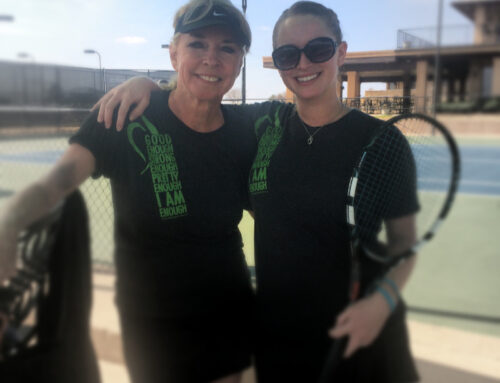When you starve your body, you starve your brain!
It’s no secret in my family that I’m not the smartest Thomas child around. My little sister recently graduated from high school at the age of 16, while my brother just wrapped up his first semester of law school. At some point in my education, I had to have a tutor for just about every subject, because nothing ever truly clicked for me. The only subject I ever felt like a natural in was writing and grammar, but my abhorrent spelling often clouded my natural writing abilities until I discovered spell check. I have had to work hard for every A I ever received.
When I started recovering from my eating disorder (ED), I began wondering how I ever managed to pass high school. Basic level courses in college often made me feel unintelligent. As I studied with friends and heard about how this was a review for them from high school, I started wondering why it all seemed like new information to me. At first I thought maybe my high school was to blame, but deep down I knew the school I had attended was not to blame. It has taken me a while to accept it, but my eating disorder is the reason I have gaps in my education. Even today it feels as though information I should have learned in high school has been cleansed from my memory, that is if I ever knew it at all.
I have continued to be poked fun of for not knowing basic things about America’s history, science, geography, math, etc, but I have finally realized it has nothing to do with being dumb and everything to do with my ED.
WHEN YOU STARVE YOUR BODY, YOU STARVE YOUR BRAIN!
When I finally recovered from my binge eating disorder around my third year of college, I found learning easier and much more enjoyable. I began to really enjoy most of my classes. I was most surprised to find that I even enjoyed Biology, which I struggled through in high school. My GPA moved from a 3.0 to a 3.5 because I could finally think, remember, and really learn for the first time in years.
I try not to take offense to people laughing as they say, “how can you not know that,” because I’m aware I just wasn’t there to learn it. However, that doesn’t mean it isn’t tough to listen to their laughter and not feel dumb all over again.
There is an upside to it all. I don’t know a lot of people my age who are still eager to learn. I’m 23, fresh out of college and excited to learn new things daily. I have a long way to go to catch up with my brother who is currently spending his summer getting a head start in law school, but I’m lucky to be looking forward to the adventure to get there.
I hate that I missed out on over 3 years of high school education because I was obsessed with food. I find it a struggle everyday to think back to high school and remember nothing but the food I ate or the sports I participated in. With all that being said, I do admire myself for not giving up and for not letting others put me down!
My mother consistently seems surprised by how observant I am today. Her surprise, often times, can be annoying. No one at the age of 24 wants to have their mother yell out in public, “You noticed that? That’s not like you!” I can’t blame her for saying it since she spent many years watching me forget what I was doing and thinking from one second to the next. She has told me stories from when she was observing my anorexic behavior. My poor mother would watch me dry a dish, turn around to put it away, and stand in place for a moment as I attempted to remember what I was planning to do with the dish in my hand. This went on throughout my anorexic years. I was constantly in tears over what I forgot to do, bring, or just what I flat out forgot (which was often what I had spent hours studying the night before).
When my binge eating days began, my mind improved, but my memory continued to suffer. I have heard other binge eaters complain of the same problem. During a binge whatever I was watching or trying to study would not stick. I often just completely forgot all I was doing during a binge. I could watch a movie while binging, and then watch it again right after a binge and feel as though it was the first time I was seeing it. My mind was focused on food and food alone.
The biggest problem with my binging behavior was the time I spent after my binge. After a binge I could easily watch a movie or TV, but studying or reading was typically out of the question. Between the pains in my stomach, my mind focused on digesting the junk food I had crammed into my body, and my head spinning from all the sugar, focusing and retaining anything seemed impossible. Balancing 18 hours of classes, a part time tennis job, a sorority, and a binge eating disorder was pretty much impossible.
I tell people all the time that I don’t regret that I had an eating disorder since it has made me who I am today, but every now and then I do regret how much I don’t know because of my ED.
I am not asking for my friends and family to stop teasing me when I can’t remember the name of a past president or solve a simple algebra equation, but I am asking everyone to remember that eating disorders are more complex than most of you can even imagine. Although it’s called an “eating disorder,” food is far from the only problem that comes along with an ED. It is a mental illness, and therefore it effects the brain in many ways. Some of those effects, the person will have to live with the rest of their lives if they don’t get help. So I ask you, if you know someone with an eating disorder, get him or her help today. If you know someone who has suffered from an eating disorder in the past, keep in mind, just because they have recovered, doesn’t mean the ED is gone forever. For most ED survivors, we are reminded of our eating disorder on a daily basis.







Hi Lana! Just want you to know that you’re amazing and an inspiration. I’m sure people who say ‘how can you not know that?’ think the same!! Knowing and understanding history is impressive but there are so many people who haven’t been through what you’ve been through who don’t know those things and don’t particularly care to. I love your attitude towards ongoing development and life long learning and I believe in you 🙂
Thanks for your comment and visiting the blog! New articles coming soon so be sure to check back. xx